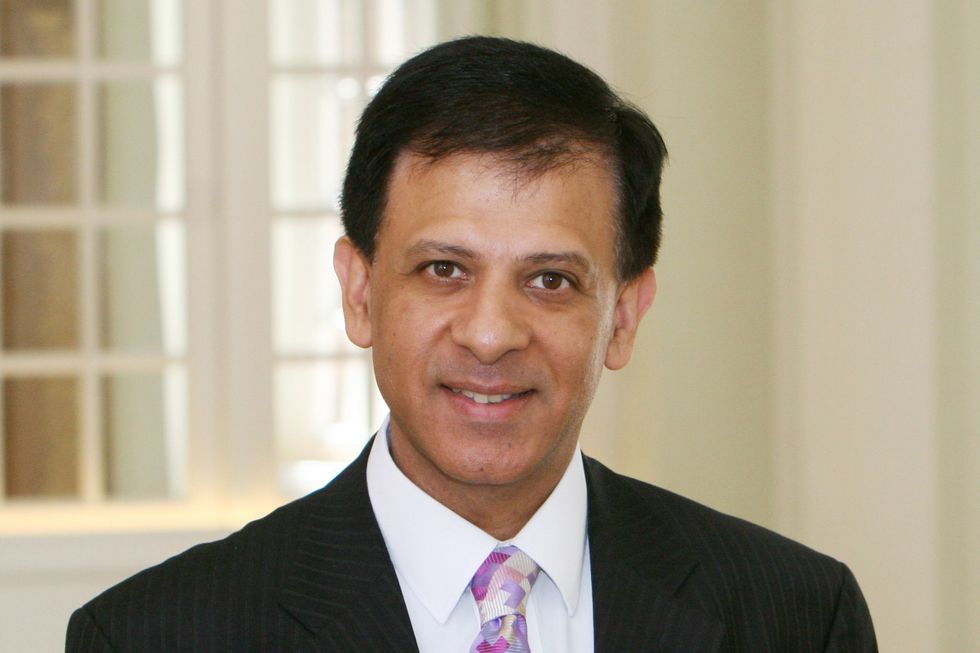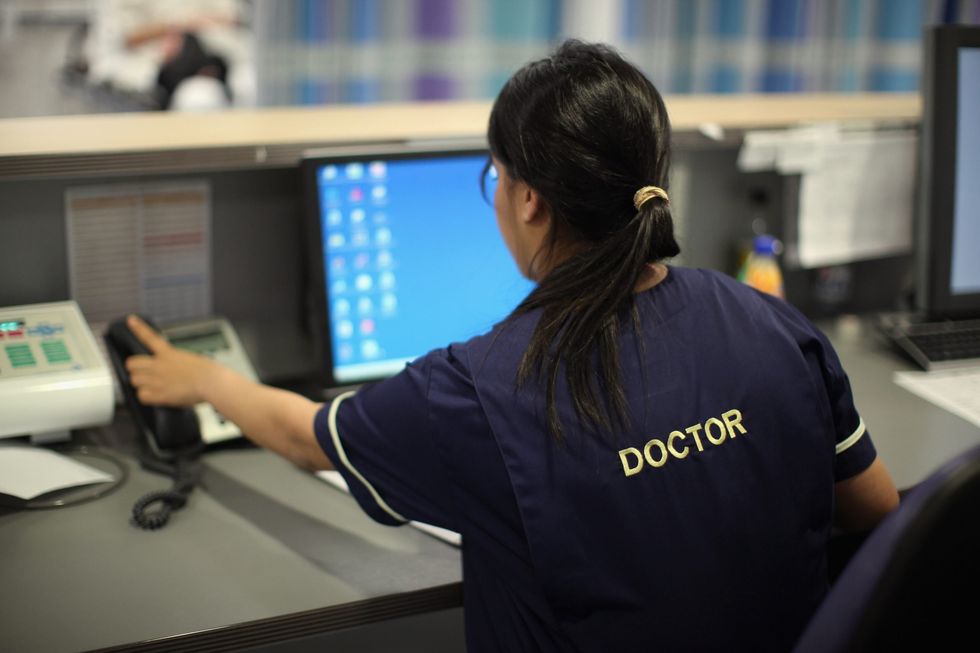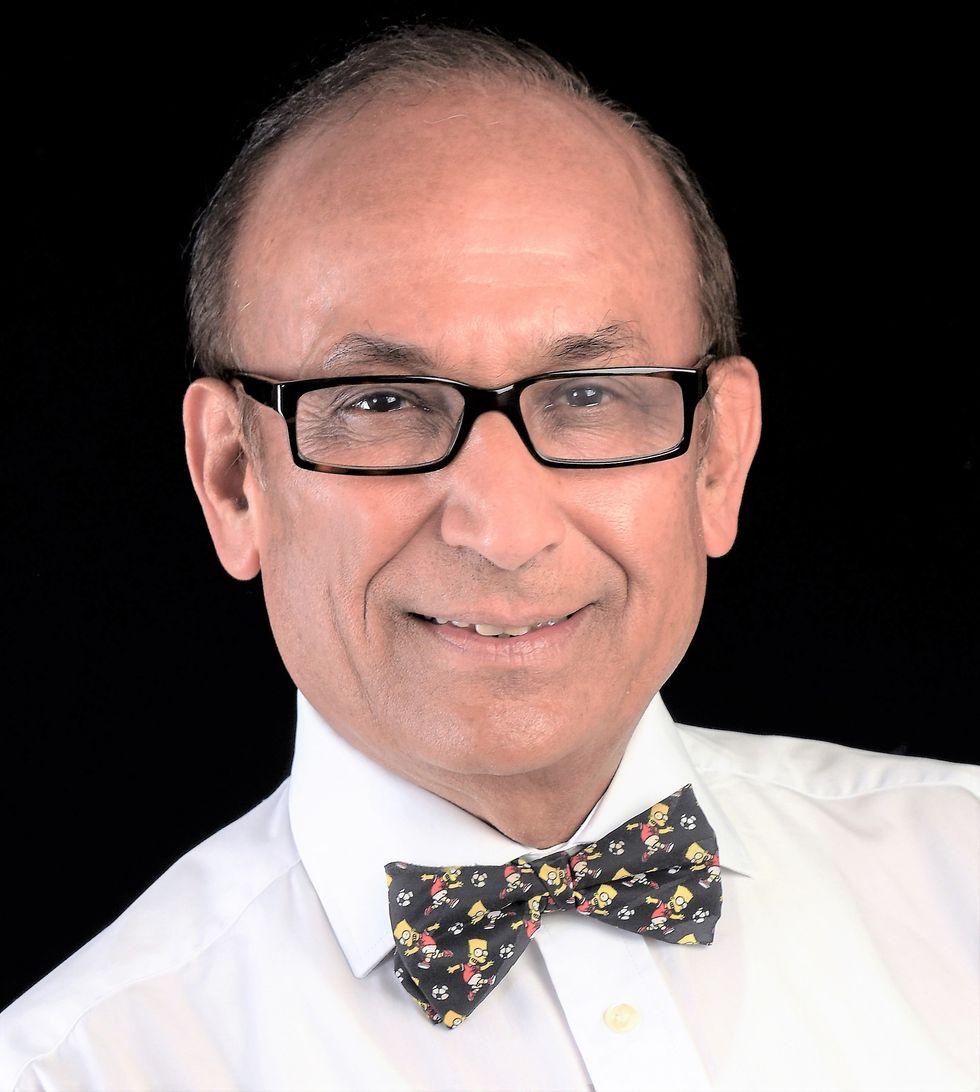“Colonial attitudes” leading to “disciplinary dice loaded against minority medics”
The chair of the British Medical Association is demanding an independent investigation into the way south Asian and black doctors are being disciplined.
Freedom of information figures obtained by Eastern Eye reveal that over the past 10 years, the General Medical Council (GMC) investigated 44 per cent of complaints against Asian medics, 10 per cent higher than for white physicians.
It follows a damning employment tribunal ruling in June, which concluded that the doctors’ regulator discriminated against a non-white surgeon on the grounds of race.
The tribunal heard that the authorities treated Mr Omer Karim, an internationally renowned surgeon, differently from a white doctor who was also under investigation.
“Ethnic minority doctors feel that they're in a system where they are living and breathing the principles of equality and fairness, but they aren't being treated equally in the workplace, nor when they're being referred,” said the Dr Chaand Nagpaul, chair of the BMA.
“Most feel that the dice is loaded against them, they experience significant discrimination, disadvantage and are victims of often very poor behaviour within their working environments.”

In the past decade, on average the GMC “erased” or struck off almost twice (1.8) as many registered Asians doctors, and five times (4.8) as many black physicians, compared to white medics.
Proportionately more black and Asian doctors are likely to be investigated than their white colleagues.
“The biggest fear for any doctor of any background is to receive a referral to the General Medical Council,” Nagpaul continued.
“Those three letters spell disaster, those three letters can actually wreck the mental state of any doctor.
“For ethnic minority doctors, they feel that their fate is sealed even before the investigation has begun.
“They have experienced inequality in their day to day lives, and what they've seen in front of them.
“In terms of the experience of others they've met, it is a system that really is just not fair to them, that doesn't give them natural justice.”
No bias
In a 2014 report funded by the regulator, researchers at University of Plymouth found “No evidence of bias or discriminatory practices was identified, either in the GMC’s guidance and criteria documentation for decision-makers, or the sampled case files”.
Academics looked at 187 so called “fitness to practice” cases which the GMC investigated in 2012.
Nine years ago, the council received almost 7,140 complaints and investigated 4,050.
That means the university looked at under five per cent of cases before coming to its conclusions.
The BMA chair told Eastern Eye, “We know that they're referred to for disciplinary processes or complaints at twice the rate as their white peers, and if you come from an overseas, if you're an overseas graduate, you're three times more likely to be referred to the GMC.
“They live in fear. We have evidence that doctors from ethnic minority backgrounds don't stand up for themselves. They don't challenge authority, they're afraid that they do so.
“They will suffer blame. They will suffer recrimination, and then it may affect their career progression. They live and breathe disadvantage.”
One south Asian doctor, who spoke on the condition of anonymity, told Eastern Eye of their experiences of being investigated.
“They don’t believe you,” they said. “You are guilty until you’re proven innocent. No matter what you say, they’re looking for evidence to convict you.
“We’re bullied and discriminated every day by our bosses, and we’re know that if we make a mistake, we’ll be scape goateed.
“I’m not alone, white patients don’t want to be treated by us and our bosses would rather they get white-led care than stand up for us.
“We’re told to work shifts other white doctors of the same experience or less don’t have to do. So, at every stage it’s rigged against us.
“The investigation took over 18-months, and after that I was cleared. I was treated like a pariah during that time.
“I couldn’t eat or sleep, and I was on the verge of quitting. I did not get any support from my trust because they were the ones who referred me.”

Shocking cases
Such cases do not surprise the British Association of Physicians of Indian Origin (BAPIO).
It’s founder and president, Dr Ramesh Mehta, told Eastern Eye that these are experiences which BAPIO has highlighted to the GMC for the past quarter of a century.
“It's not a surprise at all, although it is shocking,” he said. “Over 25 years, we have had several meetings with GMC, and we have raised this issue.

“We have also provided solutions, and we have said this is not acceptable in this day and age.
“Not only that, but it is also unfair to large majority of ethnic minority doctors, that they’re being punished unnecessarily. It is also loss of talent to the NHS, and more accurately to the nation.
“These are very talented, sincere, hardworking doctors, and they provide top quality service.”
In Mr Karim’s case, the tribunal was told that he and other doctors raised their concerns with the Care Quality Commission that ethnic minority doctors were being bullied at the Wexham Park Hospital in Slough, Berkshire.
It was referred to the GMC which decided not to take any action.
But when the hospital received complaints against Mr Karim and other members of his team, it referred the matter to the GMC.
It suspended the surgeon.
Eastern Eye understands that it was a previous trust which asked the GMC to investigate Mr Karim.
We also understand that by the time Frimley Health NHS Foundation Trust took over, it felt it had no choice but to allow the GMC to complete its investigation.
In a statement, a spokesperson for the trust said, “Since Frimley Health took over the management of Heatherwood and Wexham Park Hospitals we have worked hard to develop an open and inclusive culture across our entire trust.
“We want to be the best possible employer for all our staff, and we will continue doing everything we can to listen to staff and eliminate inequalities throughout our organisation.”
GMC concerns
The GMC said it was aware of the challenges it faced and knew non-white doctors were disproportionately likely to be investigated and eventually struck-off.
A GMC spokesperson said, “We recognise the longstanding concern within the profession about the way in which doctors from ethnic minorities are referred to the GMC, and how those referrals then progress through our processes.
“While the number and rate of these referrals remains low, our data shows ethnic minority doctors are twice as likely to be referred by their employers.
“A much higher proportion of these referrals also result in investigation, and therefore possible sanctions, than those from other sources.
“We are working hard with partners to target inequalities where they exist, both in our own processes, and across the UK health system.
In 2019, the GMC published its landmark report into the unequal treatment of black and Asian medics.
That report, Fair to Refer?, recommended changes to four areas to cut the higher referral rates for non-white doctors.
These included:
- improving the way non-UK doctors are introduced to the NHS, giving feedback and support.
- addressing the “the systemic issues that prevent a focus on learning, rather than blame, when something goes wrong”.
- improving the leadership in the NHS.
- developing a programme which delivered the recommendations across the UK.
“Whitewash window dressing”
Almost two years since the report’s publication, BAPIO’s president believes things are not moving fast enough.
“Unfortunately, the report actually came across as window dressing whitewash,” said Dr Ramesh Mehta.
“It did accept that there are a lot more referrals from the hospitals and managers, medical managers or other managers but didn't give any solid solution.
“There is absolutely no accountability for the managers, and I have to say that most of these managers are white.
“This is one of the big problems, I call it colonial attitude, and this colonial attitude is, we know the best, we are superior. You're an immigrant, you have come here to serve the NHS, listen to us.
“And this mentality, they expect the immigrants to be exactly the same way as they behave without considering the background, culture of these people.”
Targets
A GMC spokesperson said, “We have set an ambitious target to eradicate disproportionate referrals from employers by 2026 and are committed to achieving this much needed improvement through joint working with our partners.”
This “ambitious target” has not stopped the chair of the BMA calling for a more common sense approach to looking at complaints against all doctors.
“The GMC has liaison officers that work and provide advice to hospitals,” Dr Chaand Nagpaul said.
“Many referrals are referred after the advice from the GMC’s own staff. So, I think there's a real need to explore that interface as well, because we know that many complaints against doctors don't need to be referred onwards.”
Nagpaul also told Eastern Eye that his concerns went further than the GMC.
“We need to tackle racial discrimination within the NHS as a whole,” he said.
“A system where you have doctors who come from other countries working here, without a proper induction without proper support, cannot continue. It's not right, it's not fair. It's not acceptable.
“A system where doctors from ethnic minority backgrounds are bullied and harassed at twice the rate of their white colleagues is unacceptable.
“A situation where doctors from ethnic minorities don't feel confident to speak out about patient safety concerns, because they feel they will be blamed instead, and that it may affect their career progression is unacceptable.”
Cultural revolution
The Department for Health refused to comment on either the BMA’s calls for an independent investigation into the GMC’s methods of disciplining doctors or institutional, systemic and structural racism in the NHS.
NHS England pointed us to a press release it published last month, which celebrated that more non-white staff than ever were working for it.
This acknowledged that the NHS needed to do more to increase representation in senior leadership positions.
It conceded the numbers would need to more than double to represent the 42 per cent of non-white staff working in the NHS.
For the chair of the BMA, the NHS needed to undergo a “cultural revolution”.
“There's clear evidence that that sort of mental pressure on doctors does lead to greater incidences of medical error,” Nagpaul warned.
“That would apply to any doctor, except that ethnic minority doctors face those pressures at much greater degrees. So, I think that this needs a whole system approach about tackling racial discrimination within the NHS.
“At the same time, looking at the GMC processes, this needs a cultural revolution in the NHS and to actually address the disadvantage suffered by ethnic minority doctors for decades.
“Now is the time where this needs to be tackled head on.”
Analysis
Using freedom of information, Eastern Eye obtained data for complaints and subsequent outcomes for the past decade.
https://public.flourish.studio/visualisation/7008351/
It shows that from 2011 to 2015 inclusive the number of complaints against Asian doctors went up.
It decreased dramatically between 2017 and 2018, before almost doubling the following year, when the GMC published its Fair to Refer? report.
During 2020, most of the year was spent in a series of lock downs owing to the pandemic.
Eastern Eye has continually reported the disproportionate nature of black and Asian NHS staff being assigned front line jobs without proper protection.
We also highlighted the disproportionate number of deaths of non-white doctors, which was mentioned in parliament during an emergency Commons debate.
Numbers of complaints against doctors went down last year.
Now that lock down has ended, it will be important to track and analyse the data.
https://public.flourish.studio/visualisation/7008511/
Except for 2016 and 2018, the GMC investigated fewer Asian doctors per year over the past decade.
In fact, investigations of Asian medics have dropped by almost two-thirds since their peak in 2012.
But when we compare ethnicity, the GMC investigated 10 per cent more Asians than white medics across the past decade.
https://public.flourish.studio/visualisation/7008611/
The numbers of medics facing “erasure” – being struck off – are relatively small compared to those registered as being fit to practise medicine.
On average over the past decade, Asian doctors are 1.75 more likely to be struck off than white ones after the GMC investigates them.
But in 2018 and 2019, the same numbers of Asian and white doctors had their licences revoked.
That meant that just before the pandemic, Asian physicians were twice as likely to be “erased” than white colleagues.
The BMA chair, Dr Chaand Nagpaul wrote to the GMC immediately after the tribunal ruling against it concerning its handling of Mr Karim’s complaint.
He was not happy with the response.
“The GMC reiterated the need for workplace fairness, and they feel that the problem is that there are disproportionate referrals to the GMC itself,” he said.
“What it did not do was respond to my request for an independent evaluation.
“We think that in the in the light of this landmark employment tribunal ruling in the light of other statistical evidence, it cannot ignore the need to have this independent valuation and make sure that there is confidence in its processes.
“If there are any shortcomings, those have to be addressed.”
The association for doctors of Indian origin, BAPIO, also complains that the GMC does not look at the “bigger picture”.
That is the way non-white doctors are treated by their white leaders.
Last week, said its president, Dr Ramesh Mehta, BAPIO was told about a case where, over a long period of time, a doctor was continually given a different consultation room, unlike his white colleagues.
When they raised this with a manager, the senior leader was rude and assaulted the doctor.
“This manager held the doctor’s collars and shouted at them. They said, ‘do as I say to you, or you leave the job’.
“And this doctor was referred to GMC, can you believe that?
“Medical directors just refer many doctors for absolutely silly reason in what is a blame culture, which is so rampant in the NHS.
“Blame culture is not acceptable, but in real life, it's all blame culture from the managers.
“You don’t know the impact these people have on our doctors, how traumatic it is, and that’s before this huge trauma of being referred to the GMC.”
















 John Dramani Mahama welcomes Modi on his arrival in Accra last Wednesday (2)
John Dramani Mahama welcomes Modi on his arrival in Accra last Wednesday (2) South Africa’s president Cyril Ramaphosa, Brazil’s president Luiz Inacio Lula da Silva, Modi and China’s premier Li Qiang at the Brics summit last Sunday (6)
South Africa’s president Cyril Ramaphosa, Brazil’s president Luiz Inacio Lula da Silva, Modi and China’s premier Li Qiang at the Brics summit last Sunday (6)

